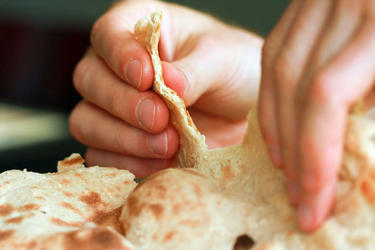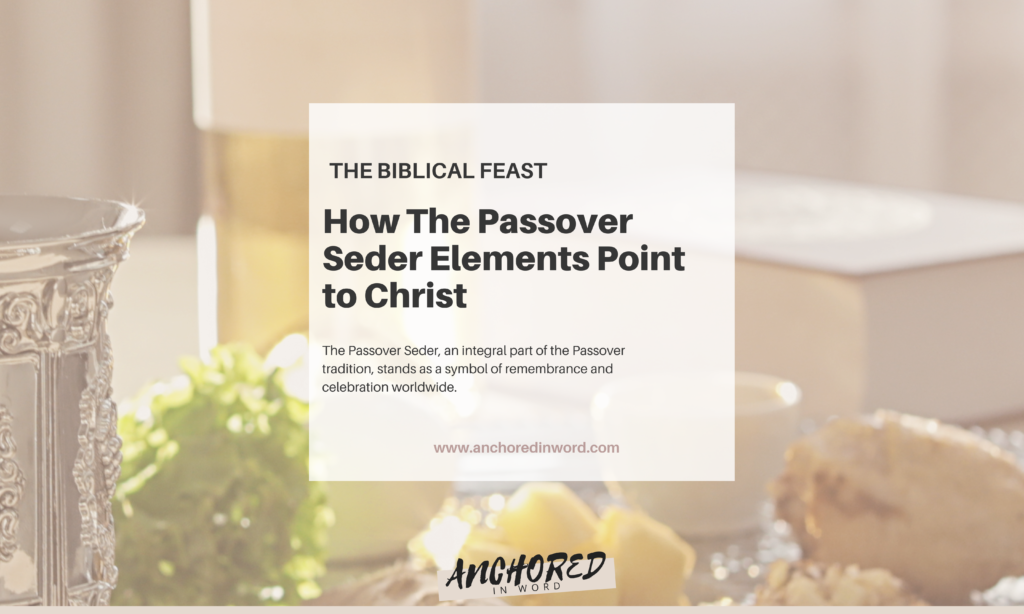For millennia, the Festival of Unleavened Bread has been celebrated by various cultures and religions around the world. But what exactly is the significance of this ancient tradition? This blog aims to delve into the roots of this festival, exploring its history, customs, and meanings. From its Biblical origins to its modern-day observances, we will unravel the layers of this intriguing festival and discover why it continues to hold such importance for so many people. Join us on a journey of exploration as we seek to answer the question: What is the Festival of Unleavened Bread?

April 22, 2024
4/22/2024 = 88
The Red Heifer and the Third Temple in End-Time Prophecy
"Speak unto the children of Israel," the Lord commanded, "that they bring thee a red heifer without spot, wherein is no blemish, and upon which never came a yoke." The cow will be given to… pic.twitter.com/GLGnJZicQI
— Susan Wood (@susieq1007) April 22, 2024
Introduction to the Festival of Unleavened Bread
The Festival of Unleavened Bread holds significant cultural and religious importance for many communities. It is a time-honored tradition that dates back centuries, signifying the historical and religious events associated with it. In the modern context, the festival represents a time of reflection, gratitude, and celebration.
Origin and Meaning
The Festival of Unleavened Bread is rooted in ancient traditions and religious beliefs. It symbolizes the haste with which the Israelites left Egypt, not having enough time for their bread to rise, hence the use of unleavened bread during this period. This practice is a reminder of their journey to freedom and the faithfulness of their deity.
Celebration Practices
During the festival, families gather to share meals that consist of unleavened bread, symbolizing humility and simplicity. They engage in prayers, ceremonies, and communal gatherings to commemorate the historical significance of this event. It is a time of spiritual reflection and unity among community members.
- Preparation of unleavened bread
- Special prayers and blessings
- Community feasts and gatherings

Historical Significance of the Festival
The Festival of Unleavened Bread holds great historical significance, dating back to ancient times. What is the Festival of Unleavened Bread can be traced to the biblical accounts of the Israelites’ exodus from Egypt.
Origin and Meaning
The festival symbolizes the Israelites’ hasty departure from Egypt, where they did not have enough time to let their bread rise, hence the prohibition of leavened bread during this period. This tradition is observed to this day.
Religious Observance
In modern times, the Festival of Unleavened Bread is predominantly observed by Jewish communities worldwide, lasting for seven or eight days, depending on the tradition. Participants adhere to strict dietary restrictions, consuming only unleavened bread throughout the festival.
Celebration and Traditions Associated with the Festival
The Festival of Unleavened Bread is a significant celebration steeped in tradition and spirituality. It is observed annually by Jewish communities around the world. During this festival, participants commemorate the exodus of the Israelites from Egypt, as detailed in the Old Testament. The festival typically lasts seven to eight days, during which various customs and rituals are followed to honor this historical event.
The Seder Meal
One of the central traditions of the Festival of Unleavened Bread is the Seder meal. This ceremonial feast includes symbolic foods such as bitter herbs, unleavened bread, and a roasted lamb bone. Each item represents an aspect of the Israelites’ journey to freedom from slavery in Egypt. Family and friends gather around the table to partake in the Seder, retelling the story of the exodus and reaffirming their commitment to faith and tradition.
Matzah and Cleaning Rituals
During the Festival of Unleavened Bread, the consumption of chametz (leavened products) is forbidden. Instead, matzah, a type of unleavened bread, is eaten throughout the festival. To uphold this tradition, households engage in thorough cleaning processes to remove all traces of leaven from their homes. This symbolic act represents the haste with which the Israelites left Egypt, not even allowing their bread to rise before departing.
Symbolism and Meaning of Unleavened Bread
Unleavened bread holds significant symbolism and meaning within the Festival of Unleavened Bread. It represents the haste with which the Israelites departed Egypt, as they did not have time to let their bread rise, hence consuming unleavened bread during this festival.
Spiritual Purity
Unleavened bread symbolizes spiritual purity and the removal of sin and corruption. By consuming unleavened bread during the festival, individuals strive for inner purity and a renewed commitment to spiritual growth.
It serves as a reminder to stay humble and not let pride or sin ferment within oneself throughout the year.
Communion with God
Partaking in unleavened bread also signifies a purer communion with God and a closer relationship with the divine. Removing leaven (which symbolizes sin) from the bread mirrors the desire for a deeper connection and intimacy with the divine presence.
- It is a time for self-reflection and repentance, seeking spiritual growth and holiness.

Comparison with Other Biblical Festivals
When exploring the festival of Unleavened Bread in the biblical context, it’s essential to compare it with other biblical festivals to grasp its significance fully. One of the key distinctions is that while the Feast of Unleavened Bread lasts for seven days, other festivals vary in their duration and rituals.
Passover and Unleavened Bread
The Festival of Unleavened Bread closely follows Passover, with the two festivals overlapping and holding deep symbolic meaning. What is Festival of Unleavened Bread, unlike Passover which lasts for one day, continues for seven days, emphasizing the removal of leaven, symbolizing sin, from one’s life.
Sukkot (Feast of Tabernacles)
Sukkot, or the Feast of Tabernacles, celebrates the Israelites’ journey in the wilderness and the divine protection provided by God. While Unleavened Bread focuses on purity and holiness, Sukkot emphasizes God’s provision and the importance of dwelling in temporary shelters.
Significance in Modern Times
In modern times, the Festival of Unleavened Bread continues to hold immense significance for those observing it. The festival, which originated from ancient traditions, has evolved to symbolize not just historical events but also personal reflections and spiritual growth.
Connection to Tradition
Despite the changes in lifestyle and technology, the festival maintains a strong connection to tradition, reminding believers of their roots and the importance of passing down customs through generations.
Understanding what is festival of unleavened bread involves acknowledging the cultural significance it holds in modern society.
Personal Reflection
For many individuals, observing the Festival of Unleavened Bread serves as a time for introspection and personal growth. It offers a moment to pause, reflect on one’s actions, and strive for self-improvement.
- This period encourages individuals to evaluate their lives, make amends, and set new goals.
- It provides a sense of renewal and purification for the mind and soul.
Frequently Asked Questions
- What is the Festival of Unleavened Bread?
- The Festival of Unleavened Bread is a Jewish celebration that commemorates the ancient Israelites’ exodus from Egypt, as described in the Hebrew Bible.
- When is the Festival of Unleavened Bread usually celebrated?
- The Festival of Unleavened Bread typically falls in the spring, following the Jewish holiday of Passover.
- Why is unleavened bread significant during this festival?
- Unleavened bread is significant during this festival because it symbolizes the Israelites’ haste in leaving Egypt, as they did not have time to let their bread rise before their journey.
- How do people celebrate the Festival of Unleavened Bread?
- During the Festival of Unleavened Bread, people abstain from consuming leavened bread and instead eat unleavened bread for a designated period to honor the tradition.
- Are there any specific rituals associated with the Festival of Unleavened Bread?
- One of the primary rituals associated with the Festival of Unleavened Bread is the removal of all leaven from the home before the holiday begins, symbolizing the removal of sin and impurity.
In Conclusion: Unveiling the Festival of Unleavened Bread
As we conclude our exploration into the Festival of Unleavened Bread, we have uncovered the rich historical and religious significance behind this ancient tradition. This festival holds a profound meaning, emphasizing the importance of purity, remembrance, and spiritual renewal. By abstaining from leavened products, participants symbolically remove impurity from their lives, embracing a fresh start and a deeper connection with their faith.
Through the rituals and practices associated with the Festival of Unleavened Bread, individuals are reminded of the Israelites’ exodus from Egypt and the enduring commitment to honoring God’s commandments. This celebration serves as a time for reflection, gratitude, and unity within the community.
May the essence of this festival inspire us to cleanse our hearts, minds, and souls, leading us towards a path of spiritual growth and enlightenment. Let us carry the lessons learned from this ancient tradition into our modern lives, fostering a deeper sense of faith and connection with our beliefs.